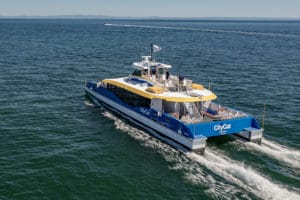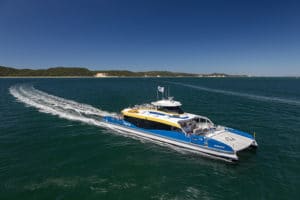For public transport operators, accessibility and ease of use are essential to design considerations across all vehicles and vessels in their fleet. However, there remain limitations in accessibility across all forms of transport that must be addressed urgently to ensure compliance and equal access to all.
Whether you’re operating recreational transport or getting people from A to B on their daily commute, you are obliged under the Disability Standards Accessible Public Transport Act (DSAPT) to provide an accessible environment for passengers with disabilities.
Understanding your obligations and the available solutions is key for all public transport operators across Australia to ensure compliance. So, to demonstrate how this can work in action, we’re sharing some important tips and information, including the story of how our consultation on accessible design solutions has allowed a new fleet of ferries to provide equitable access to all members of the public.

While the DSAPT was created to provide clarity to public transport users and operators, there remains some complexity in the application, due to the crossover of disability legislation, codes and standards. The pre-2002 standards remain referenced at times, which creates confusion for operators looking to create or alter designs. There is also the need to comply with the Building Code of Australia requirements, which includes references to both the old and new disability standards. For this reason, seeking guidance and advice from an experienced and accredited access consultant on how to meet obligations and provide a safe and comfortable environment for users of all abilities is a must.

We work with operators to conduct an access audit that looks at all parts of the facility and journey, from the pathways and resting areas to the signage and access points. We can then assist with the development of a Disability Action Plan which sets out how changes will be made to promote equality and reduce discrimination against people with a disability.
An example of a recent partnership to create accessible public transport is our collaboration with Aus Ships Group. As designers and builders of high-quality transport solutions for commercial, defense and luxury marine industries, they required expert advice on accessible ferry design for a design and construction project for the City of Brisbane. Here’s what they had to say:
‘The Aus Ships Group engaged Equal Access to work collaboratively on our revolutionary next-generation City Cat Catamaran Ferry design and construction project for the City of Brisbane. The Group’s technical design and production teams have been very satisfied with the level of detail and technical knowledge that comes from Equal Access as our DDA Consultants, and we have no hesitation in recommending them for the assessment of transport projects.’
If you require advice or guidance on creating accessible environments on new and existing public transport, our experienced team of access consultants would love to help. Get in touch today for friendly and knowledgeable advice on 1300 994 890.